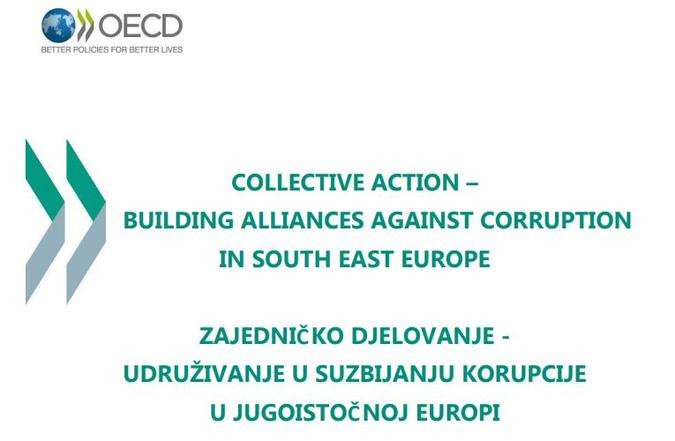Collective Action – Building Alliances Against Corruption in South East Europe

Webinar OECD/OCSE
Il webinar, organizzato dall'OECD/OCSE (Organizzazione per la cooperazione e lo sviluppo economico), riunisce funzionari governativi, rappresentanti delle imprese, società civile e mondo accademico per discutere di come l’azione collettiva può aiutare a prevenire la corruzione, promuovere l'integrità e raggiungere condizioni di parità per tutti gli attori del mercato
Weak institutions and insufficient enforcement practices spur corruption and anti-competitive behaviour, which discourage new and much-needed investments and alienate business transactions. In the face of the widespread and deep-rooted corruption, individual actions alone are insufficient to bring about significant ethical changes and achieve transparent processes. Collective actions across a given sector can be more effective in promoting commonly defined rules, which are adhered to globally and individually. This type of action is an important tool in advancing integrity and achieving a level playing field for all actors in the market. Beyond better economic outcomes, collective actions also boost the reputation – and thus economic attractiveness – of countries where such initiatives are deployed.
In South East Europe the perceived level of corruption remains fairly high (Corruption Perception Index 2019), which can lead to market distortions and hamper sustainable economic growth (OECD Competitiveness Outlook 2018). A common understanding of this pressing issue is needed to build mutual trust and to induce tangible change. The webinar therefore aims to gather government officials, business representatives, civil society and academia to understand how "Collective Action" and OECD toolkits and international practices can help fight corruption while supporting efforts in creating fair market conditions in South East Europe.
The webinar will spread over two days, starting with a plenary session and continuing with three country specific sessions. The plenary roundtable will bring key actors on Collective Action to discuss global lessons on the advantages of implementing Collective Action initiatives and share OECD tools and practices in combatting corruption across the economy and society. Insights from this roundtable will form an important basis to discuss how Collective Action can be applied in South East European context and support ongoing efforts in the fight of corruption.
The subsequent country roundtable will be dedicated to the Collective Action challenges and priorities of Croatia, Bosnia and Herzegovina and Serbia. Stakeholders from the private sector, government, academia and civil society will share their experiences and examine how Collective Action can help countries’ implementing reforms in the fight against corruption.
Speakers include:
● Ms. Sabine ZINDERA, Vice President, Legal and Compliance, Head of Collective Action, Siemens AG
● Mr. Andreas SCHAAL, Director for Global Relations, OECD
● Ms. Isabel CANE, Head of Trust in Business Initiative, OECD
● Mr. Carlos CONDE, Head of the Middle East and North Africa Division, OECD
● Ms. Gemma AIOLFI, Head of Compliance, Basel Institute on Governance
● Ms. Ieva LAPEIKIENE, Head of the Clear Wave initiative in Lithuania
● Ms. Neslihan YAKAL, Secretary General, TEID Ethics and Reputation Society
● Mr. Vladan JOKSIMOVIC, Head of Secretariat, Regional Anti-Corruption Initiative
● Ms. Ivana KORAJLIC, Executive Director, Transparency International BIH
● Mr. Velibor MACKIC, Advisor to the President of Republic of Croatia
● Mr. Miroslav MILETIC, Advisor to the President of the Chamber of Commerce and Industry of Serbia
The webinar will take place via Zoom and advance registration is required via these links:
24th of September:
- 09.00-12:00, Plenary roundtable - Global lesson on the advantages of implementing collective action
- 14.00-16.00, Roundtable Croatia - Putting collective action into practice. Factors of success
25th of September
- 09:00-11:00, Roundtable Serbia - Putting collective action into practice. Factors of success
- 14.00-16.00, Roundtable Bosnia and Hercegovina - Putting collective action into practice. Factors of success
After registering, you will receive a confirmation email containing information about joining the meeting. If you have any technical issues please contact William.GRAFF@oecd.org.
For any other questions related to the agenda please contact Vera.RADEVA@oecd.org
INFO:

